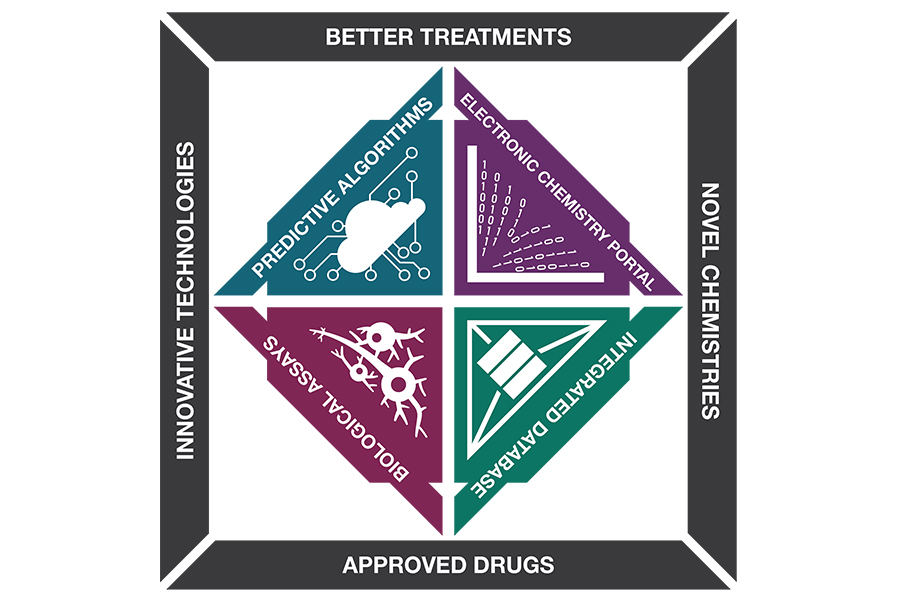As part of the National Institutes of Health (NIH) Helping to End Addiction Long-termSM Initiative, or NIH HEAL InitiativeSM, NCATS supports and facilitates a variety of funding and collaboration opportunities designed to address the opioid crisis, including pain management.
- Current Funding Opportunities
- Translational Research Collaboration Opportunities
- Expired Funding Opportunities

(Daniel Soñé Photography)
Current Funding Opportunities
- RFA-NS-20-009: HEAL Initiative: Development of Therapies and Technologies Directed at Enhanced Pain Management (R41/R42 Clinical Trial Not Allowed)
- RFA-NS-20-011: HEAL INITIATIVE: Development of Therapies and Technologies Directed at Enhanced Pain Management (R43/R44 - Clinical Trial Not Allowed)
- NOT-TR-19-018: HEAL Initiative: Announcement of Collaboration Opportunities for Developing Drugs and Human Cell-Based Testing Platforms for Pain, Addiction and Overdose
- NOT-TR-19-025: Notice of Change to HEAL Initiative: Announcement of Collaboration Opportunities for Developing Drugs and Human Cell-Based Testing Platforms for Pain, Addiction and Overdose
- NOT-TR-19-009: Notice of Correction to Revise Application Due Dates for NOT-TR-19-001 Notice of Availability of Administrative Supplements for Microphysiological Systems Developers: Development of Tissue Chips to Model Nociception, Opioid Addiction and Overdose
Translational Research Collaboration Opportunities

How do I:
- Translate my animal-based research discovery into a human-based model for continued testing and development?
- Advance my research on a potential therapeutic from plated cells into more complex, human cell-based models?
- Modify my compound to make it a drug?
- Collect the necessary data on my compound to advance towards testing in humans? What steps are involved?
Are these questions that you are wrestling with on your therapeutic development project? NCATS welcomes your NIH HEAL Initiative-related proposals to advance promising compounds and human cell-based models through preclinical development as a team-based, research collaborations with NCATS’ intramural scientists in the Division of Preclinical Innovation.
- As research collaborators, you bring a wealth of background knowledge and a starting point for a particular translational project.
- NCATS scientists provide expertise and resources to transform those starting points into therapeutically useful tools, platforms, or investigational drugs.
- Approved projects result in formation of joint project teams that will work together to design and follow milestone-driven project plans to achieve pre-agreed to deliverables.
View a slide presentation on Developing Drugs and Testing Platforms for Pain, Addiction and Overdose in Collaboration with NCATS (PDF - 2.45MB).
To view a presentation on how to collaborate with NCATS scientists, please go to 5:34:00 in the following video: https://videocast.nih.gov/Summary.asp?Live=31408&bhcp=1.
NOT-TR-19-018: HEAL Initiative: Announcement of Collaboration Opportunities for Developing Drugs and Human Cell-Based Testing Platforms for Pain, Addiction and Overdose
Learn more about collaborating with NCATS scientists and how to submit a proposal.
Expired Funding Opportunities

- NOT-NS-20-023: Notice of Special Interest to Encourage Eligible NIH HEAL Initiative Awardees to Apply for PA-18-906 Research Supplements to Promote Diversity in Health-Related Research (Admin Supp - Clinical Trial Not Allowed)
- NOT-TR-20-008: Notice of Special Interest for HEAL Initiative: Request for Administrative Supplements to Existing Grants for Identification and Validation of New Pain and Opioid Use Disorder Targets within the Understudied Druggable Genome
- NOT-NS-20-049: Notice of Change in Expiration Date and Cancellation of Final Three Receipt Dates for RFA-NS-19-018 "HEAL Initiative: Clinical Devices to Treat Pain (UH3 Clinical Trial Optional)."
- NOT-NS-20-048: Notice of Change in Expiration Date and Cancellation of Final Three Receipt Dates for RFA-NS-19-017 "HEAL Initiative: Translational Devices to Treat Pain (U44 Clinical Trial Optional)."
- NOT-NS-20-047: Notice of Change in Expiration Date and Cancellation of Final Three Receipt Dates for RFA-NS-19-016 "HEAL Initiative: Translational Devices to Treat Pain (UG3/UH3 Clinical Trial Optional)."
- NOT-EB-20-009: Notice of Change in Expiration Date of RFA-EB-18-003 "HEAL Initiative: Translational Development of Devices to Treat Pain (U18 Clinical Trial Not Allowed)"
- RFA-AT-20-004: HEAL Initiative: Pragmatic and Implementation Studies for the Management of Pain to Reduce Opioid Prescribing (PRISM) (UG3/UH3, Clinical Trials Optional)
- NOT-NS-20-020: Notice of Intent to Publish a Funding Opportunity Announcement for HEAL Initiative: Pain Management Effectiveness Research Network: Clinical Trial Planning and Implementation Cooperative Agreement (UG3/UH3 Clinical Trial Required)
- NOT-AR-20-016: HEAL Initiative: Back Pain Consortium (BACPAC) Research Program Notice of Special Interest (NOSI) regarding the Availability of Urgent Competitive Revisions
- NOT-AR-20-012: HEAL Initiative: Back Pain Consortium (BACPAC) Research Program Notice of Special Interest (NOSI) regarding the Availability of Urgent Competitive Revisions
- RFA-NS-19-018: HEAL Initiative: Clinical Devices to Treat Pain (UH3 Clinical Trial Optional)
- RFA-NS-19-017: HEAL Initiative: Translational Devices to Treat Pain (U44 Clinical Trial Optional)
- RFA-NS-19-016: HEAL Initiative: Translational Devices to Treat Pain (UG3/UH3 Clinical Trial Optional)
- RFA-TR-19-005: HEAL Initiative: Biofabricated 3D Tissue Models of Nociception, Opioid Use Disorder and Overdose for Drug Screening (UH2/UH3 Clinical Trial Not Allowed)
- RFA-TR-19-003: HEAL Initiative: Tissue Chips to Model Nociception, Addiction, and Overdose (UG3/UH3 Clinical Trial Not Allowed)
- NOT-TR-18-031: HEAL Initiative: Announcement of the NCATS ASPIRE Design Challenges to Develop Innovative and Catalytic Approaches Towards Solving the Opioid Crisis
- RFA-EB-18-003: HEAL Initiative: Translational Development of Devices to Treat Pain (U18 Clinical Trial Not Allowed)
The NIH HEAL Pain Management Effectiveness Research Network (NIH HEAL Pain Management ERN)
Using NCATS’ Clinical and Translational Science Awards Trial Innovation Network, the NIH HEAL Pain Management ERN will support studies to compare the effectiveness of existing pain treatments and novel approaches to prevent and manage pain while reducing the risk of addiction. The goal is to provide clinicians with information about the effectiveness of treatments or management strategies that reduce opioid use and pain associated with many types of diseases or conditions. Learn more about how the NIH HEAL Pain Management ERN will use the Trial Innovation Network for these studies.
- RFA-NS-19-021: HEAL Initiative: Pain Management Effectiveness Research Network: Clinical Trial Planning and Implementation Cooperative Agreement (UG3/UH3 Clinical Trial Required)
- NOT-NS-19-028: Notice of Change to Key Dates for RFA-NS-19-021 "HEAL Initiative: Pain Management Effectiveness Research Network: Clinical Trial Planning and Implementation Cooperative Agreement (UG3/UH3 Clinical Trial Required)"




 NCATS co-hosted a
NCATS co-hosted a 